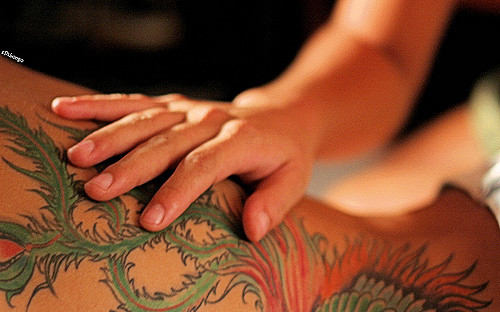
I awoke this morning like I always do, opening one eye to see the gentle grey of the sun’s first rays filtering through the curtains. A deep breath of cool air filled my lungs, and as I released it, my head nestled deeper into the burrow of his bare shoulder.
Then, in a ritual we started back when our bodies and minds were still mysteries to be discovered, I closed my eyes and gently traced his skin, following the angle of his jaw and the ridge of his brow, feeling the tickle of his whiskers and the warmth of him beneath my fingertips.
We lay among the whispers of daybreak, the ticking of the clock and sounds of the city awakening outside of our window coaxing us from our sleepy haze.
I slowly ran my fingers through his hair, my thumb lightly tracing the round of his ear and the curve of his neck. I moved my hand along the ridge of his chest and felt goosebumps on his skin as my fingers slowly danced down his arm.
He tenderly reached for my head, lifting it up as he turned to his side and folded me in his arms. A smile played on his lips, and he wrapped himself around me, holding me one last time before the day’s responsibilities claimed our attention.
We begin each day with this dialogue, in a language of touch we only share with each other. I have memorized his every curve and every hard and soft spot of his body.
Before we ever say a word, my fingertips tell me if he is tense or concerned, or if he is at peace or happy. With the stroke of a hand, we each have the power to soothe and nurture each other despite the constant weight of caring for our children’s needs, paying bills, and fulfilling our many roles as adults.
Touch can be erotic and passionate, but most of the time, it is simply a language that speaks in an intuitive dialect that our verbal language cannot adequately translate.
In fact, non-sexual touch is one of the most intimate connections we can have with other human beings. We all need it, yet all too often we fail to provide—or worse, we withhold—physical touch for those we care about.
From the loving caresses a mother gives her baby to chest bumps and high fives shared by teammates, science is now offering explanations as to why it is so important, and why, whether we are lovers, friends, or strangers, we need touch to make us perform better and to feel better about each other, ourselves and the world around us.
When we touch each other, our pituitary glands release oxytocin, the “feel-good” hormone. This hormone is behind the bond that mothers form with their newborns, and behind the feelings of connection and love that we feel with friends, family, and in relationships, and lust in new relationships.
When we don’t produce enough oxytocin, we feel sad and depressed. When we have enough oxytocin, we feel empathetic, trusting, and happy.
In 2003, researchers Andrew and Michelle Gulledge and Robert Stahmann found that the more couples massage, hug, kiss, caress, and hold hands with each other, the happier they are. They also found that couples who touch each other tend to be better at resolving conflict. University of North Carolina researchers found that hugs from our partners or spouses encourages heart health and help regulate blood pressure.
For many of us, study after study concludes what our bodies have confirmed all along: we need to touch each other, and we need to be touched.
Touch is perhaps the most powerful way to express kindness, empathy and love, and to convey them in a way that bypasses the cognitive cloud of the head. Touch connects heart to heart, soul to soul, in a conversation that wordlessly speaks volumes.
And in the break of dawn each morning, as our bodies mold against each other in a tangle of tender warmth, it is a language of nurturing and appreciation.
As the sun makes its way over the horizon and our lives urge us on, we begin the day knowing through touch that we are loved, and that we are not alone on this journey of life.
Author: Amanda Christmann
Image: ePi.Longo/Flickr
Editor: Renée Picard







Read 0 comments and reply